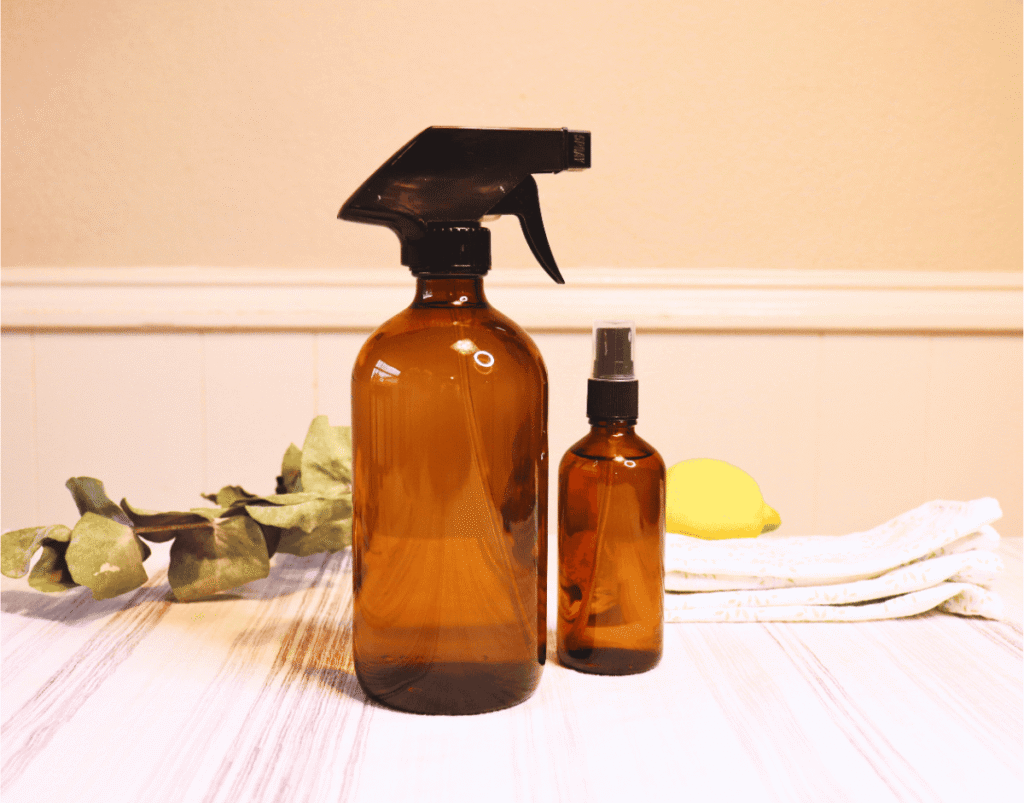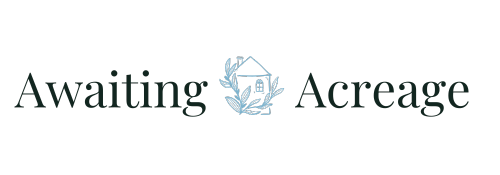This post may contain affiliate links. Read our disclosure policy here.
If you are looking to clean your home with safe, natural ingredients mixed in your own kitchen, then look no further! In this post you will learn how to make two different recipes for all-purpose cleaner to use in your kitchen, bathroom, and more.

Why two different recipes you ask? Well, if you look online for a natural cleaning spray, odds are you will find a thousand different recipes for a simple vinegar-water solution. You will also probably find that vinegar is not always the cleaning superpower you had hoped for. Don’t get me wrong, I clean with vinegar all the time. But there are shortcomings with it that call for a second, more powerful cleaner to use alongside it.
That’s where this simple 2-step process comes in: A vinegar solution, and when needed, an alcohol spray to join alongside it.
It’s still simple. It still saves you money. and most importantly, it is still worlds safer than what you can buy at your local grocery store. The only difference is that it has more true disinfecting power than using only a vinegar solution.
Benefits of Using Homemade All Purpose Cleaner
- It’s safe – Making your own all purpose cleaner allows you to avoid harsh, synthetic ingredients that you don’t want you or your family to be constantly exposed to.
- It’s cheap – The cost of making your own cleaner is pennies compared to the cost of natural (or even standard) cleaners lining supermarket shelves.
- It’s easy – It takes about a minute to mix up these solutions and they are shelf stable.
What Can You Use These Cleaners On?
| Surface Material | Vinegar Spray | Rubbing Alcohol Spray |
| Glass/Windows/Mirrors | ✔ | ✔ |
| Laminate & Vinyl | ✔ | ✗ |
| Tile | ✔ | ✔ |
| Plastic | ✔ | ✗ |
| Bathroom Surfaces & Fixtures | ✔ | ✔ |
| Marble | ✗ | ✔* |
| Granite | ✗ | ✔* |
| Stainless Steel | ✗ | ✔ |
| Wood Surfaces | ✗ | ✗ |
*As always, take care when cleaning stone surfaces such as granite, marble or even stone tiling. ALWAYS do a spot check when using a homemade all purpose cleaner to make sure the solution does not damage the stone or sealant before using.
Looking for something to clean wooden floors? I use this recipe!
This post contains affiliate links, which means I make a small commission at no extra cost to you. See my full disclosure here.
Vinegar All Purpose Spray Recipe
Equipment
- 16oz Glass Spray Bottle (I recommend these USA-made Spray Bottles)
Ingredients
- White Vinegar
- Distilled Water
- Essential Oils (optional)
Directions
- Fill a glass 16oz spray bottle with equal parts distilled water and white vinegar.
- (optional) Add 5-10 drops of your preferred essential oil. Be sure the oil you choose is safe for the surface you are cleaning. Good options are lemon, pine, or eucalyptus oil.
- Close and shake the bottle to mix.
Homemade all purpose vinegar cleaner can be stored in a cool, dark place. It is self-preserving, so don’t worry about it going bad.
Rubbing Alcohol All Purpose Spray Recipe
A note on cleaning with rubbing alcohol: Use caution. This solution is completely safe, but it can be harsh on some surfaces. Be sure to refer to the table above to see what you can generally use it on. Always do a spot check when you are not sure.
When cleaning with this solution, use a damp cloth. After wiping down the surface go over it with a second cloth to dry the surface. It takes about fifteen extra seconds and ensures that my surfaces are always damage-free.
Equipment
- 16oz Glass Spray Bottle (I recommend these USA-made Spray Bottles)
Ingredients
- Distilled Water
- Rubbing Alcohol
- Castile Soap
- Essential Oils (optional)
Directions
- Fill a 16oz glass spray bottle with 1 part rubbing alcohol and 3 parts distilled water.
- Add 1 tsp. of Castile soap
- Add 5-10 drops of your preferred essential oil. Be sure the oil you choose is safe for the surface you are cleaning. Good options are lemon, pine, or eucalyptus oil.
- Close and shake the bottle to mix.
- Always use with a damp cloth and then go over the cleaned surface with a second cloth to dry it afterwards. Do not let the spray sit on the surface like you would vinegar.
This homemade cleaner can be stored in a cool, dark place. It is most effective if used within 2-3 years of mixing.
About the Ingredients
Distilled Water
Distilled water lacks the impurities and additives present in tap water. This helps homemade cleaners to remain shelf-stable without a possibility of contamination. It also keeps residue and streaks from being left on surfaces after cleaning.
White Vinegar
White vinegar cuts through grease and grime and naturally deodorizes surfaces. Think of vinegar as more of a cleaner than a disinfectant. It does disinfect some bacteria such as salmonella and E. coli, but it should not be used as your sole cleaning spray. Never use vinegar with bleach or on surfaces that may retain traces of bleach.
Rubbing Alcohol
Rubbing alcohol is a powerful disinfectant, killing germs, bacteria, and viruses upon contact. It is fast-drying, meaning that it is great for cleaning windows and mirrors without leaving streaks. Never use rubbing alcohol with bleach or on surfaces that may retain traces of bleach.
Castile Soap
Castile Soap is a concentrated, vegetable-based soap often used in cleaning as a natural alternative to other ingredients. It is an effective cleaner and disinfectant, popular in not only household cleaners, but also skin and hair products. Very little is needed in most recipes due to the product’s concentration, making it quite affordable.
Essential Oils
Essential oils are not just present in homemade all purpose cleaner to smell nice (though that is a great bonus). Many have antiviral, antibacterial, or anti-fungal properties that really bump up your cleaners to the next level. Some great ones to include in your arsenal are:
- Tea Tree Oil (antiviral, antibacterial, and anti-fungal)
- Eucalyptus Oil (great for seasonal allergies and mold)
- Lavender Oil (antibacterial)
- Cinnamon Oil (antibacterial and antiseptic)
- Pine Oil (antibacterial, anti-fungal, kills pathogens and yeast spores)
Example Cleaning Schedule Using Vinegar and Alcohol Sprays
Daily or after general use: Spray surfaces with vinegar all purpose spray and let it sit for at least 5 minutes. Wipe the surface down before the vinegar dries.
Unlike rubbing alcohol, vinegar is more effective if you let it sit on the surface for a bit. Be generous with the amount you spray so that it doesn’t dry out while it sits. I use this spray to wipe down kitchen counters and tables after general use.
Weekly or every time a surface needs something stronger: Spray surfaces with alcohol all purpose spray then immediately wipe it down with a cloth dampened with water. Do not let the alcohol spray sit on surfaces. After wiping down with the damp cloth, go over the surface with a second dry cloth to dry the surface.
Every week, go over your kitchen surfaces with the alcohol spray to disinfect them thoroughly. I also use this after cooking with raw meat or anything else concerning comes in contact with my counters/table.
More From Our Natural Living Collection
- 7 Crucial Ingredients to Make All Natural Cleaning Products
- How to Make Fire Starter Lint Logs
- How to Melt and Reuse Leftover Candle Wax
If you try our homemade all purpose cleaner recipes and like them, please consider giving this a 5-star rating to help others find it!

Leave a Reply